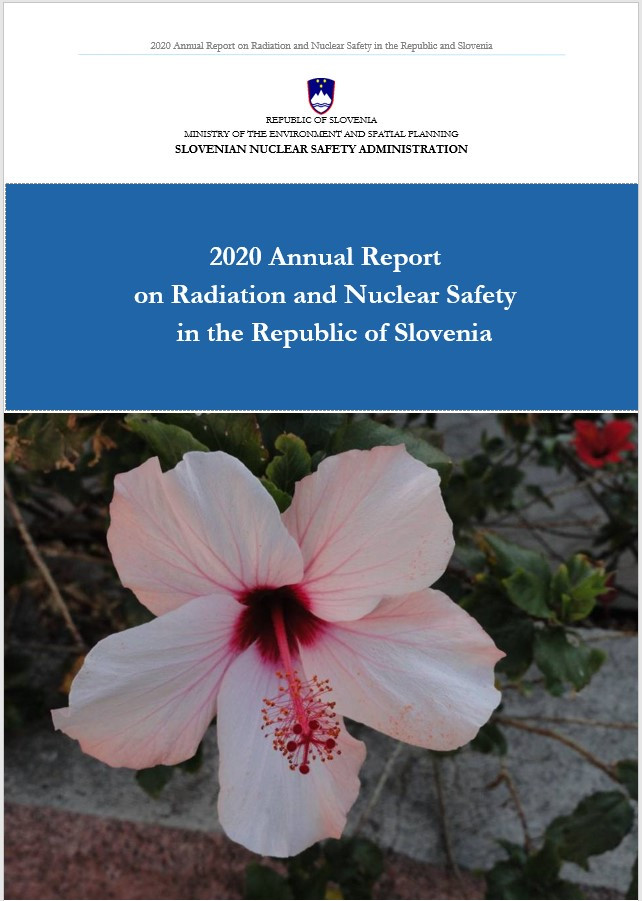2020 Annual Report on Radiation and Nuclear Safety in the Republic of Slovenia
The report summarizes all developments related to nuclear and radiation safety in 2020. The report in English is available on the website.
During the reporting year a fundamental objective of nuclear and radiation safety "The protection of people and the environment from unnecessary harmful effects of ionizing radiation." has been achieved.
The year 2020 was marked by the Covid-19 epidemic. The Krško Nuclear Power Plant (Krško NPP) and others have adapted their work to the conditions, thus preventing the epidemic from having harmful effects on nuclear and radiation safety. As part of its activities, the Slovenian Nuclear Safety Administration (SNSA) also monitored the impact of Covid-19 on nuclear and radiation safety and adapted its work to the epidemic business conditions by always performing its administrative and supervisory tasks effectively.
In 2020, the Krško NPP operated safely. The Krško NPP reported six events that did not affect the population or the environment.
The Krško NPP continued its work on the third phase of security improvements from the Safety Upgrade Programme (SUP), such as the construction of Bunkered Building 2 (BB2), the installation of additional coolant injection and long-term cooling systems and the upgrading of the technical and operational emergency support centre. Most of the SUP improvements were completed in 2021.
One of the most important activities of the last period of the SUP is the construction of a dry spent fuel storage facility. In December 2020, the Ministry of the Environment and Spatial Planning issued a building permit for a facility for the dry storage of spent fuel in the Krško NPP area. The process of licensing the dry storage under the law governing nuclear safety has also begun. This is an extensive administrative procedure, which was not completed in 2020. Preparations for the construction of a dry spent fuel storage facility began in March 2021, and the transfer of the first part of the spent fuel elements to the dry storage facility is planned for the beginning of 2023.
In 2020, preparations for the Third Periodic Safety Review (PSR) began. The Krško NPP prepared a PSR programme approved by the SNSA at the end of 2020. The third PSR was launched in February 2021 and will run until June 2023, when the final safety review report together with the improvement Action Plan will be submitted to the SNSA for review and approval.
Last year, the implementation of the Action Plan prepared by the SNSA and the Krško NPP as part of the European Topical Peer Review in the field of aging began. The measures implemented in 2020 mainly included thematic inspections in the areas of cable aging, shielded pipelines and reactor vessels. The results show that the Krško NPP has a well-developed aging monitoring and control process, which is also reflected in the good condition of the components, systems and structures.
In 2020, the Interstate Commission for Monitoring the Implementation of the Interstate Agreement on Co-Ownership of the Krško NPP adopted a revision of the programmes for the decommissioning of the Krško NPP and the disposal of radioactive waste and spent fuel from the Krško NPP. The newly adopted programmes are the basis for determining the contributions that GEN Energija and Hrvatska elektroprivreda, as owners, must each pay into their own fund for financing the decommissioning and disposal of radioactive waste and spent fuel. The Government of the Republic of Slovenia has increased the amount of the contribution for the Slovenian Fund and imposed on the company GEN energija, d.o.o., the obligation that from August 2020 onwards, it pays into the Fund EUR 4.8 for each MWh of electricity obtained from the Krško NPP.
The Agency for Radioactive Waste (ARAO) continued its activities for the construction of a low- and intermediate-level radioactive waste repository in Vrbina near Krško. A public presentation of the environmental impact report in Slovenia and a cross-border environmental impact assessment procedure were carried out, which had not yet been completed by the end of the year. Given the dynamics of the activities and actions of the bodies involved, the challenge that the storage facilities for such waste at the Krško NPP will be filled and that there will be no landfill available remains very relevant. Despite the difficult situation due to the Covid-19 epidemic, the ARAO carried out the collection, transport and safe storage of institutional radioactive waste without any problems.
The Central Radioactive Waste Storage Facility in Brinje (CSRAO) operated without any special events.
At the Boršt hydrometallurgical tailings dump of the former uranium mine in Žirovski Vrh, the problems due to rock landslides have not been resolved, so the search for solutions for closing the landfill continues.
In 2020, the planned monitoring of radioactivity in the environment went smoothly. Based on the results of the measurements, it was established that the load of the population of Slovenia due to the presence of artificial radionuclides in the environment is below all legally determined limits and is comparable to previous years. Furthermore, operational monitoring of all facilities was carried out according to the planned annual programmes, and the activities of released radioactive substances into the environment were below the authorised limit values. As a result, the burden on the population was lower than prescribed and negligible compared to the ever-present natural background.
In 2020, there were no major problems for radiation practitioners. The SNSA dealt with a total of 13 intervention cases, of which eight cases of an increased dose field in the transport of scrap metal materials through the territory of Slovenia.


